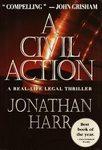 I picked it up from Payless. I recalled watching the movie though I didn't recall being impressed by it. However, the declaration that it was the "Best book of the year" by Entertainment Weekly compelled me to buy it. It was only RM15 anyway. It did turn out to be quite an interesting read. I'm even prepared to say that it was 'unputdownable', if there is such a word.
I picked it up from Payless. I recalled watching the movie though I didn't recall being impressed by it. However, the declaration that it was the "Best book of the year" by Entertainment Weekly compelled me to buy it. It was only RM15 anyway. It did turn out to be quite an interesting read. I'm even prepared to say that it was 'unputdownable', if there is such a word.I have always been interested with courtroom drama. Law & Order is one of my favourite shows and I wish someone could bring it back to Malaysia. They can even show the reruns, I won't care. I love court movies like JFK, Primal Fear, 12 Angry Men and Ghosts of Mississipi. But yet I never read much of courtroom drama books.
I did pick up One L by Scott Turow once upon a time. The book is about his experience studying at Harvard Law School, one of the best law school in the world. It was a great read and at the same time killed my insanely outrageous dream of becoming a lawyer. Just reading what they have to go through made me cringe and the book only covered the first year, which most people say is the toughest year of law school. The amount of reading they have to go through, the stuff they have to remember, papers to prepare, Q&A sessions in the classrooms, I think I'll pass. Everytime the mere thought of rekindling the dream surfaces, I would just think 'One L' and I will regain my sanity.
Enough of that, let's get back to A Civil Action. The book is about a real civil case in Boston back in 1980s. 13 families sued two major companies for polluting their drinking water and causing the high occurance of leukemia cases in their town whereby 8 children died. Kind of like Erin Brockovich without the 1 million bonus at the end.
One of the defendants, Beatrice Foods, got off while the other, W.R Grace ended up paying 8 million dollars as a settlement. Schlictmann spent so much money to pull this case together that he ended up bancrupt even after getting his share of the settlement. And worst of all the families didn't get any of the companies to admit their mistake and clean up the water.
He was a bit outrageous in his expenditures. Can you imagine paying an expert US200 per hour for consultation fees? One of the doctors even get US100 per hour as a discount sleeping rate i.e. he gets US200 when he's awake and US100 when he sleeps. Schlictmann would place these experts in 5-star hotels everytime they come into town. When questioned by his partner, he would just say, "They're worth it".
But Schlictmann did have a case against the companies. However, he was over-confident and got too cocky in the middle of the trial that he loose focus. I also blame the judge for making bad calls throughout the entire case.
Right after I finished the book, I watched the movie again and the first lines were...
It's like this. A dead plaintiff is rarely worth more than a living severely maimed plaintiff. However, if it's a long slow agonizing death as opposed to a quick drowning or car wreck, the value can rise considerably. A dead adult in his 20s is generally worth less than one who is middle aged. A dead woman less than a dead man. A single adult less than one who's married. Black less than white. Poor less than rich. The perfect victim is a white male professional, 40 years old, at the height of his earning power, struck down at his prime. And the most imperfect, well in the calculus of personal injury law, a dead child is worth the least of all.
I think it's kind of funny that they made this as the opening line because the part that struck me the most was the part when the author tried the explain the value of a life. Harr was not as eloquent as the writer of the movie but he basically mentioned that the bread winner of a family would have a higher value than one who's not like a child for example.
Yes, it may sound shocking but if you think carefully, it is the truth. Kind of makes you think the next time you hear, "Save the women and children first!" Is it because they have compassion for the women and children because they are generally weaker or is it because they don't worth much dead?

No comments:
Post a Comment